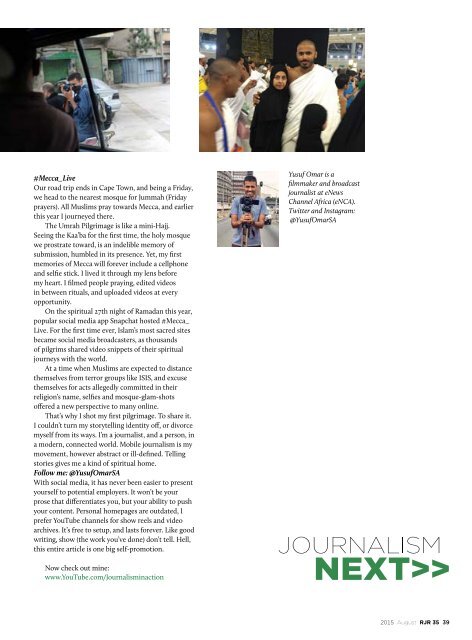Full RJR35
You also want an ePaper? Increase the reach of your titles
YUMPU automatically turns print PDFs into web optimized ePapers that Google loves.
By Kayla Roux<br />
TRIGGER WARNING: MENTIONS OF RAPE, GENDER-BASED VIOLENCE<br />
Whether you believe in the power of social<br />
networking for political participation<br />
or are cynical of the ‘clicktivists’ and<br />
their ‘slacktivism’, there’s no denying it: social<br />
media politics have become an inescapable part of<br />
our digital lives. From online petitions and NGO<br />
fan pages to heated Twitter wars and politicallymotivated<br />
hacking, the internet has opened up<br />
countless new avenues in which people can express<br />
their support for causes, lobby powerful interest<br />
groups, and register their dissent with a wellorchestrated<br />
hashtag or viral campaign. But what if<br />
one social network becomes the site of the struggle?<br />
What about when our digital lives become the<br />
subject of our politics?<br />
It makes sense when you consider the amount<br />
of time and energy many of us pour into our social<br />
media accounts: they are the digital equivalent<br />
of the ancient Greek agora or your favourite<br />
neighbourhood pub, and provide countless<br />
opportunities for self-expression and networking.<br />
It has become a place of work, play, communication<br />
and relaxation for millions of internet users.<br />
Importantly, it has also become one of the biggest<br />
and richest corporations in the world, their revenues<br />
based on auctioning personal information to<br />
advertisers for the highest price.<br />
For this reason, many activists are not only using<br />
social media to network, increase exposure and exert<br />
influence – they are petitioning the way social media<br />
sites themselves are structured.<br />
In 2013, a coalition of over 100 women’s rights<br />
and social justice groups orchestrated a campaign<br />
aimed at forcing social media giant Facebook to<br />
review its content classification policy – and it<br />
worked. For years, Facebook maintained a stony<br />
silence regarding requests from users to remove and<br />
condemn graphic content glorifying and trivialising<br />
domestic abuse, rape, and gender-based violence.<br />
Making use of Facebook’s bewildering and<br />
convoluted reporting system, users can provide<br />
feedback about what they would like to see and what<br />
they would rather not. Reported content is reviewed<br />
against Facebook’s community policy, and, if found<br />
wanting, removed with a warning for the originator<br />
of the content.<br />
This mechanism helps to keep Facebook free<br />
from graphic violence, pornography, hate speech,<br />
trade in controlled substances and the like –<br />
supposedly. Instead, what most users reporting<br />
drastically unfunny rape jokes and images of<br />
bloodied and bruised women found was that<br />
Facebook’s community standards were inconsistently<br />
applied at best, and deeply misogynistic at worst.<br />
In the maintenance of their community<br />
standards, Facebook made it clear whose side it<br />
was on (spoiler alert: it’s not women). Countless<br />
reports about graphic depictions of gender-based<br />
violence and rape and joke pages glorifying the<br />
abuse of women were returned with a glib message:<br />
‘Thanks for your report. We reviewed the content<br />
you reported, but found it doesn’t violate Facebook’s<br />
Community Standard on hate speech’. I’m not talking<br />
about the odd offensive joke or sexist comment;<br />
most of the content on the Facebook pages in<br />
question was so graphic that they could not be<br />
reproduced or linked by mainstream news websites:<br />
graphic images of gore, beaten children, naked<br />
children, women bound and gagged, or thrown<br />
down stairs.<br />
40 RJR 35 August 2015


